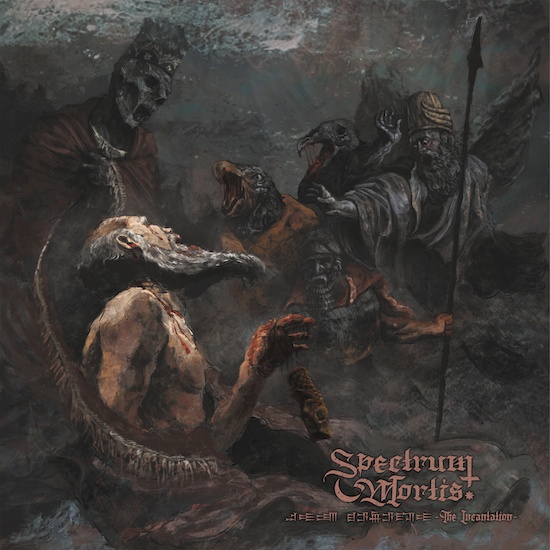
(The Spanish band Spectrum Mortis just released their new album Bit Meseri -The Incantation last Friday through Listenable Records, and to remind you of that signal event and provide great insights into it, today we present Comrade Aleks‘ extensive interview of the band’s mysterious members.)
A few weeks ago we published an interview with the Finnish traditional doom metal band Spiritus Mortis, but constant NCS followers rather remember the Spanish secret band Spectrum Mortis!
We promoted the band’s debut album Bit Meseri -The Incantation insistently, and I bet that you remember the album’s remarkable artwork (by Khaos Diktator Design)! I love that macabre Messopotamian twist. They call it “ritualistic doom metal”, and though it’s a more complex blend of genres you can track Spectrum Mortis’ influences anyway.
Honestly, I don’t see a reason to tell you more, as the interview (which I prefer far more than any review) offers the band an opportunity to say it in the most straight-forward way, and Spectrum Mortis’ collective mind does it in detail.
******
Hail Spectrum Mortis! How are you doing? What’s going on in your coven?
Hail there! Well, things are ok here now. There is no stopping! After the enormous work that has been done composing the album and recording it, now it’s time to try to ensure that this edition has the impact it deserves, so we are concentrating part of our efforts on promotion.
We have recorded a video clip that we hope can be released shortly, and that has literally taken us to the limit of our physical state due to the conditions in which it was recorded, with really extreme heat and in a very inhospitable place. In these weeks we are also taking the opportunity to work on a new set list in our rehearsal room. Our intention is to start in the coming months with the first shows in order to play the album, so the wheel does not stop turning. We are also designing a bit of plans for the near future, what the next steps should be and composing new material to be able to offer within the next years.
Editor’s Note: Here’s the video!
Can you tell more about this clip? It’s interesting to know what you did to prepare and if it was worth such efforts.
The video clip was recorded during the summer of this 2022, probably one of the hottest in Europe for many decades. In addition, the place where it was recorded (we don’t want to reveal it) was in an area with very difficult access, so a huge physical effort had to be made to be able to move all the material to that place. Our goal with this clip was to try to represent the healing ritual referred to in the title of the album. In those images there are different elements that we refer to in that song and we thought it was a very good idea to try to visually recreate what we had recreated through music and lyrics.
The video was recorded and edited in an absolutely professional way by Álex Moreán, a person with great talent and creativity and member of our brothers Aversio Humanitatis. We are very proud of what we have done, it has a very special spirit and fits perfectly with the song.
The band was formed in 2015 and I didn’t find if some of you played in other bands before. What is your musical background?
Indeed the band was founded some years ago. All the members of Spectrum Mortis have a background in other bands of the Spanish scene, but we believe that it is not important to mention them. It’s not about creating mystery about it, we simply believe that the band’s music should speak for itself. Spectrum Mortis has become an entity where its members are blurred and dehumanized, becoming mere shadows.
There really are people who already know us on a personal level and know about our past and present in other bands, but as we say, we don’t think it’s important. Spectrum Mortis was founded as an autonomous, solid and strong project that does not need any connection with other bands. We understand that the question you ask is simply at the level of pure interest, but well, we don’t think it’s really important to reveal what other bands we participate in.
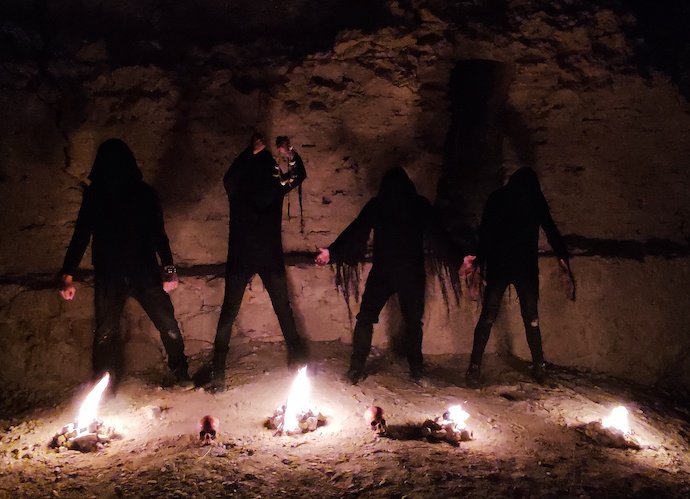
Hah, well, I do interview Spanish bands episodically so I was wondering if I ever interviewed some of you before. And you’re on Listenable now, that’s a respectful label, how did you get on it?
Listenable contacted us. It’s funny, but in our experience with other projects it has always been the reverse process, that is, the bands have tried to find a label with which to release stuff, so that approach by Listenable surprised us a lot and as you can imagine, we are very happy about it. It really is an honor that someone comes to your music simply because they like it, since Spectrum Mortis is a band that has always moved in the most underground circuit, that is, Listenable knows that they are not going to get rich with us, but they are aware of our potential.
You started with the EP Blasphemare Nomen Eius (2016), with lyrics based on the books The Explicit Name of Lucifer and Sacerdotium Umbrae Mortis by Gilles de Laval. How did you manage to complete these ideas in one release?
Our intention has always been to seek a real commitment to our lyrics and the concept that we want to deal with in each release. For this it is important to read, investigate and reflect on aspects that we think may be interesting for our lyrics. All our works have always delved into how the human being interprets the reality that surrounds us, especially in its most existential aspect. Throughout the history of mankind we have tried to explain everything that surrounds us through religion, metaphysics or science. These different conceptions have a real physical impact, that is, all these interpretations usually have a material reflection in our day to day life through morality, ethics or even laws.
In the case of these two books, what we tried to do was find information about that part of human consciousness based on a figure that goes beyond the creator himself. The figure of Lucifer is recurrent in many cultures throughout history, it is easy to establish parallels with the Phoenician Baal, the classical Prometheus or other figures from, for example, the Mesopotamian pantheon. The lyrics of that EP revolve around that figure that grants light and will to power that creation limited us and that we ourselves limit with certain ethical-moral codes.
The lyrics of Spectrum Mortis will always try to investigate those most hidden aspects of human thought and physical and metaphysical reality, under different perspectives, cultures and cosmogonies but always with that primitive objective: to know ourselves and the reality that surrounds us.
Does this knowledge help you to understand shit that happens nowadays, like current wars and this pandemic?
No, those processes are probably easier to explain and understand with other methods. We can understand war with a few lessons in history, geopolitics and economics, from a more materialistic plane; and the pandemic with some notions of biology and medicine. Perhaps it can be a help on a more spiritual level related to passions, desires and hopes in the case of war; and the fear and panic caused by illness and death in the case of the pandemic.
Did you feel that Spectrum Mortis’ arsenal is enough to express your message correctly?
Spectrum Mortis does not really have a proselytizing function; we do not intend to create a path for others to walk, it is simply a way through which we reflect and project that reflection, so in a certain way it is enough for us, it is a way of channeling concerns that are difficult to channel otherwise.
Music continues to have something primitive, alchemical and magical within the whole of the arts, something that makes us cry and be happy; dream or suffer a nightmare. It is a really fascinating way of altering human consciousness that is still difficult to explain and understand logically, hence perhaps its magic. Many think that probably the first sample of artistic expression of human beings could have been music, so perhaps it is capable of connecting with something irrational, visceral and essential in our soul that connects us with something greater.
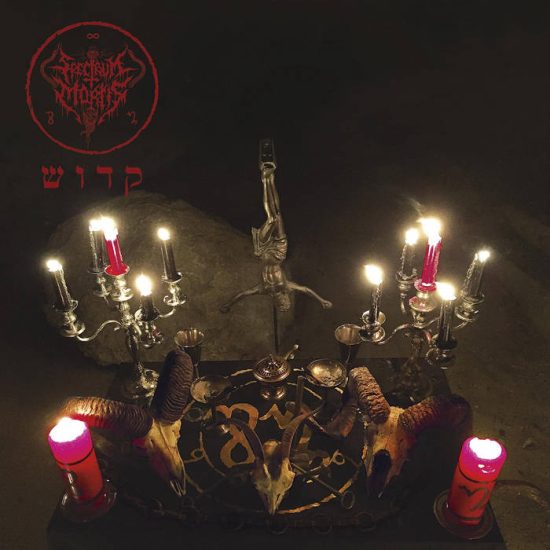
The concept of your next EP קדוש was taken from Fosforos by Johannes Nefastos.
That’s right. In part it can be understood as a kind of conceptual extension of our previous EP in the sense that we are still dealing with essentially the same idea. In this case we try to emphasize destroying the existing dialectical concept in many religious and moral codes between good and evil, one of the aspects about which Johannes Nefastos’ work talks about. In some way, both EP’s complement each other, delving into the figure of Lucifer and the tangible consequences this figure can have on our ethical-moral behavior.
You tagged Spectrum Mortis’ musical direction as “Ritualistic Metal of Doom”, and it’s an amalgam of a few different genres including black metal. How would you sum up your general influences?
We are people who have lived through the end of the eighties and the beginning of the nineties, when death metal, black metal, thrash or doom merged and interacted without any kind of problem. Over time, genres, subgenres and sometimes too-closed “definitions” have been marked, probably under the influence of increasingly exacerbated consumerism that is always looking for labels that can sell.
With the term ritualistic metal of doom what we really intend is to say a lot without specifying anything…we are a band influenced by the death metal of the late eighties and early nineties of bands like Incantation, Necrovore and Morbid Angel, but we are also marked as much by the black metal of the Greek or South American scenes, the doom of the beginnings of bands like Paradise Lost, or the more doom and ritualistic parts of Beherit, Tiamat or Samael. We are undoubtedly looking for the intensity and aggressiveness of those first extreme metal bands where black metal was confused with death metal, but also density and darkness.
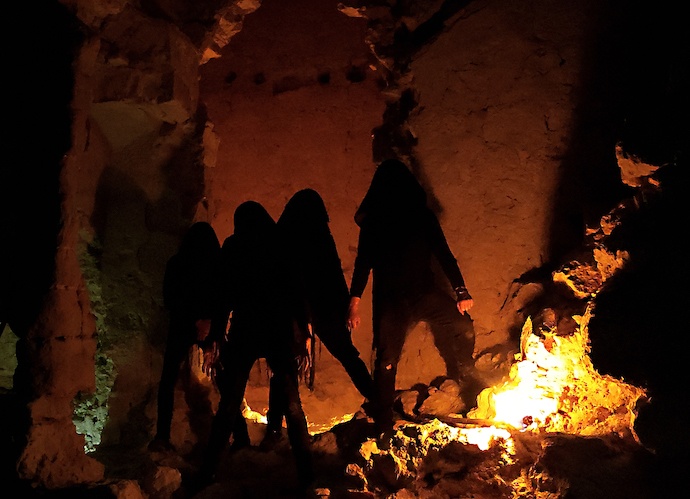
And how does the “ritualistic” element manifests itself in your music?
Probably that more “ritualistic” aspect from the musical point of view is marked by the more rhythmic and percussive parts. There are parts highly influenced by Greek black metal or, for example, the slower parts of Beherit, above all triplet-rhythms that give our music that more primitive and ritualistic character. If you analyze traditional European music, it is generally influenced by that type of more triplet-rhythms, something that can also be seen in other traditional music from other latitudes, it gives the feeling that this kind of rhythm leads us to something more primitive and ancestral.
From a more conceptual point of view, we try to work on that facet both in our lyrics and in our live performances, in which we try to make the viewer live a more complete sensitive experience, encompassing not only the acoustic but also the visual and even the olfactory, since for that we use different types of incense that try to recreate that more ethereal, ritualistic and magical atmosphere.
That’s always cool to learn when bands have such a dedicated approach to their art. So in the end is Spectrum Mortis a more artistic or rather a more spiritual act for you?
It is not necessary to dissociate the artistic from the spiritual, that is, obviously the artistic implies an exercise of physical creation, of something tangible and material and therefore perceptible by the senses, but that process is spiritual in the sense that in every creative process is involved the soul, and therefore, art is a physical extension of the soul itself. We tend to pose reality as a dichotomy, and this dichotomy often leads to the opposition of two realities in the form of a nemesis when they really constitute a whole, life/death, happiness/sadness, light/darkness… on many occasions these elements constitute a whole, and in the case of art, there is clearly a connection between the spiritual and the material channeled through artistic creation.
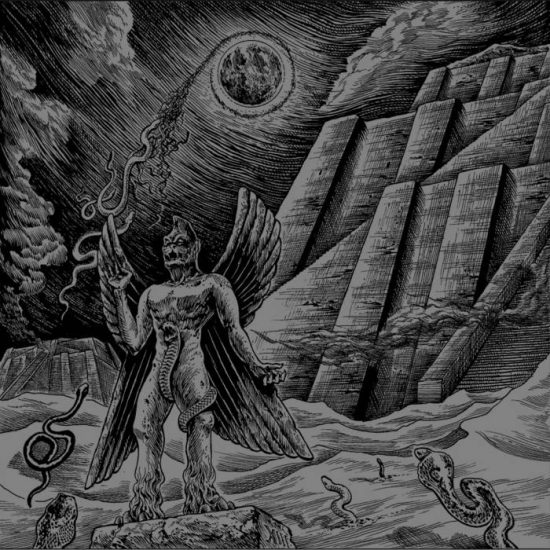
Then there was a split album Spectrum Mortis and Hacavitz – Ad Noctem. How did you get in touch with Hacavitz?
The relationship between both bands began a few years ago when we shared the stage in a show in Madrid, and since then we have collaborated and tried to forge a certain bond that materialized in this case with the edition of that split. We have grown up with this type of format. In the history of extreme metal great splits have been forged such as Masacre / Profanatica, Necromantia / Varathron or more recent ones such as Teitanblood / Proclamation or Teitanblood / Necros Christos, and although today it seems that they are not very popular, we really like them as an audience and also as a band, so we will continue working with these kinds of editions. As for Hacavitz, we hope to be able to share stages again in the future and will continue to strengthen our bond.
What unites Spectrum Mortis and Hacavitz? I see that you used end-to-end numbering of the Ad Noctem songs as the whole album serves one certain idea, or does it?
Yes, the intention was to find a point of connection between both bands from a conceptual point of view, that is, that in some way we would not do the typical split where each band does its part without any connection, but that there would be something working as a link between both bands, hence those references in the title or in the lyrics of both bands.
At the time of this discussion, Bit Meseri -The Incantation is to be released on the 30th of September, and it’s your first full-length album. What kind of message did you put into these tracks?
Bit Meseri revolves around the vision of life and death that existed in Ancient Mesopotamia, both in its belief and in its cosmogony. What we tried was to investigate everything we could about that culture and tradition, also looking for elements with which we could even establish some empathy today.
Bit Meseri, in particular, refers to an ancient Mesopotamian ritual with which it was intended to cure a sick person. It is curious to see how the human essence continues to be on the same basis, that is, the way in which a patient and the relatives who surround that person face that moment continues to be very similar. The mystery that surrounds life and death, the way in which people had at that time to face that reality as well as the disease itself, continue to be daily aspects that we follow and try to explain through science, religion or metaphysics, and it really seemed interesting to delve into these topics and see how we can still feel reflected in that mirror of the past.
Why did you choose Ancient Mesopotamian traditions? Which sources did you use regarding completing the lyrics?
Perhaps we chose that culture because of the enormous mysticism that surrounds it. On the one hand, it is far from the European “canons” in the sense that we live under the influence of religion and morality derived from the great monotheistic religions, but at the same time, there are important elements of cultural connection, such as the existence of state structures, similar economic relations, urbanism… in the end, some can find parallelism despite the geographical and temporal distance, and that seemed very interesting to us. In fact it is something that we will probably continue doing in the future with other cultures.
As for the sources, we are lucky to have a member linked to historiography, and that has helped somewhat. As a recommendation, there are the works of Benjamin Read Foster, Jean Bottero, Jean Leveque or J.M Prada with his work Mitos y Leyendas de Mesopotamia (perhaps there is an English translation). There is a really interesting book called Gods, demons and symbols of Ancient Mesopotamia: an illustrated dictionary written by Jeremy Black, with some poems and interesting literature. There is also a work called The Ancient Gods by E.O. James with a comparative view about religions of the Eastern Mediterranean.
How do you see your progress on this album music-wise?
We do not believe that there is really a “progress”, we are really using elements that we already used in the past. Perhaps what we have tried is to provide them with more order and meaning, seeking the right atmosphere at all times and working on an album as a whole. This means that we have thought about the order of the songs, how they start and how they end or how they interact with each other, in a very conscious way. In that sense there may be some more work, but deep down we continue with the same musical essence, we don’t think there will be a big change in that sense.
The artwork for Bit Meseri – The Incantation artwork is quite remarkable. How is it connected with the album’s content? How did you work with its author Stefan Todorović?
Well, we had a very clear idea. We wanted to represent that healing ritual that we were telling you about before, but including other elements of the Mesopotamian cosmogony, such as the apkalus and other references. It also had to be a cover that reflected the content of the album, that is, that was dark but at the same time dynamic and aggressive. The moving posture of the central character gives the scene that dramatic vividness, just as the baroque setting gives it that dark and sinister character that we wanted to achieve. The work is really superb and we are very satisfied with the final result. It is a really spectacular cover. Inside the album there is also a really powerful image of a ziggurat, since we also wanted to reflect the ominousness and strength of that culture, represented in those great constructions.
As Spectrum Mortis performs “ritualistic” music, how do you organize your live rituals? Do you pay a special attention to your live shows?
We already discussed something before. For us shows must be a reflection of our music and our lyrics. We believe that everything should go hand in hand and there should be no cracks between these elements. We do not want the image to “devour” our music, it is clear that music is the central element of our proposal, but we also believe that we must create something solid that represents what Spectrum Mortis is, that is why in our appearances we try to pay a lot attention to the image. Right now we are working on future shows in order to play the album live, and we are going to try to transfer all that dark and ritualistic essence onto the stage.
How do you see Spectrum Mortis’ ultimate goal?
There are not goals, the path is a goal itself.
Thanks for the interview! Mesopotamian gods speed you ON!
https://www.facebook.com/spectrummortis
https://spectrummortis.bandcamp.com/album/bit-meseri-the-incantation
